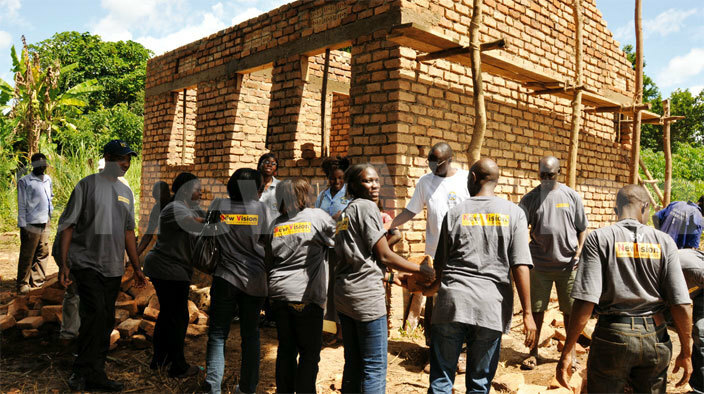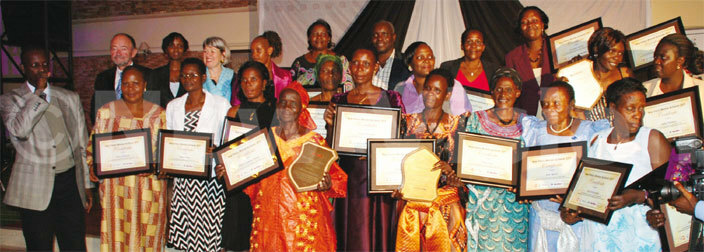Vision gives the woman a voice
Mar 08, 2016
The Women’s Vision came at the time when women emancipation was at the core of national discourse

As part of the celebrations to mark its 30th anniversary, New Vision documents some of her contribution towards women emancipation and social justice

When no other dared, New Vision did. It started as a small venture that would soon blow out to a full scale movement. This was back in 1994, when women issues were just that; women issues.
Some may have found room on the table of men, but many Ugandan women's voices were muffled in kitchen soot. New Vision, then only eight years old and in the thick of the discussion of women emancipation started something just for the women;
Women's Vision.
"The Women's Vision came at a time when women emancipation was at the core of the national discourse," the Vision Group Editor-in-Chief, Barbara Kaija recalls. "A few years later, Parliament passed the law requiring that a third of the representatives
from the grass-root level to Parliament should be women."
It was a whole discussion that New Vision knew needed its own section. "When the Women Vision started, the campaign was; Speak out, do not be gagged," she says. "Women were just beginning to speak out in Parliament, the local council level; they were not just stuck in the kitchen and the bedroom. They too needed to be heard!"
New Vision found a way to make sure that the product would catch the eye of every woman. "When we started, the rationale was that we needed to target the total woman.
We needed to give women role models and as a result, we always had a profi le of a winning woman, a woman who had achieved!" Kaija further explains. There was always a woman's issue to discuss, one that touched just about any topic, from bride price, women and the law, women in business, women and in-laws, and so much more.
 Nyakato being guided to her old house
Nyakato being guided to her old house"We deliberately sought out women who were outspoken on those issues to speak, both at the local and national leadership levels, " she says. To attract even more women, New Vision had to get creative.
"We always had a page on women and fashion, which did not go down quite well with some of the women activists, who thought that it derided women," Kaija explains. "But we knew that if we were to get all the women, even those that had been shut out of development, we needed to lure them in, and fashion was a good way to achieve that."
Soon, some talented writers like Keturah Kamugasa joined the team and she took on the role of fashion adviser, a thing women loved. "As a result, many of us, who were not fashion conscious, learned a few things. Those were the major segments, but targeting the whole woman, which was the philosophy, so as to give women a voice."
Kaija believes that as a result of the Women's Vision, now Her Vision, a lot of issues were addressed. "We actually saw issues addressed, for example, when we campaigned against female genital mutilation, these issues would be discussed in Parliament," she recalls.
"We would write about an issue, and because we often involved the parliamentarians, using their pictures in the pullout, they embraced the discussion and talked more openly in Parliament."
 Vision Group staff during construction of Nyakato's new house
Vision Group staff during construction of Nyakato's new house
Involving the women
Catherine Mwesigwa Kizza, the deputy New Vision editor, tells of how they had to keep the new venture afl oat. "First of all, as journalists we had a role to play; go out into the fi eld, fi nd these women and tell their stories," she says.
"It was with that in mind that New Vision started the Women Achiever's awards." She says the whole idea started by just looking for 10 women at the grassroots and profiling them for their endeavours at making society better for women. These women, she said, would mostly be working with families and communities in different areas.
"We developed the model to focus on different themes every year. For example, we
have profi led women making a difference in entrepreneurship, environment, education, in maternal health and agriculture, among others," she explains.
Every year, Mwesigwa says, they have been amazed at the stories New Vision has uncovered stories that might have seen the light of day
"But also, for every time we have organised these awards, one of the major voices that come out are those of women saying; if they can do it, so can we!" she says. "I believe that there is a huge impact out there. When we do stories on domestic violence and inequalities, people start to think that there is no good out there. That is why we also decided to do some more on emancipation and empowerment."
Applauded
Tina Musuya, the executive director for the Centre for Domestic Violence Prevention
(CEDOVP), could not hide just how pleased she was with New Vision's efforts to highlight women issues.
"First of all, the fact that New Vision has always been upfront in discussing issues concerning women in all spheres is a big deal," she says. "Where role models are needed, they have been provided in terms of profi les, building in trust the fact that women can manage just as well."
Musuya applauds New Vision for the technique they use in reporting issues concerning
abuse of women. "Many times when there has been a rape, New Vision has pointed it out from the angle of an issue and not scandal, which is good for advocacy for women's issues," she added.
Musuya also says New Vision has contributed a lot on the issues of the girl-child. "The
girl-child is the woman of tomorrow and the articles help shape policy," she adds.
Elizabeth Masaba, a midwife and counsellor with the Kampala City Council Authority, says sometimes the newspaper turns counsellor, to women with marital problems.
 Some of winners and nominees for the 2011 Woman Achievers Awards in Kampala pose with their certificates
Some of winners and nominees for the 2011 Woman Achievers Awards in Kampala pose with their certificates
"So many things affect women, and by just discussing these issues and finding solutions, it helps," she says. Kyambogo University lecturer Guston Byamugisha believes New Vision steers the discussion on women issues in the country.
"There is a whole product dedicated to women, and also stories published almost every day on women issues that wind up in many discussions," he says.
Byamugisha believes that the stories have been shared in salons and restaurants. Rose Nakalema, an HIV/AIDS advocate, cannot forget Joan Nyakato, the blind, widow and HIV-positive, whose life was turned around by the New Vision.
"It was a touching story, I could not sleep after reading it in New Vision," Nakalema narrates. "Then the next time I read, there was a whole campaign to build her a house." Richard Kimbowa of the Uganda Coalition for Sustainable Development, is quick to flip the discussion to New Vision's farming stories.
"Women are the majority when it comes to farming, through Harvest Money in particular, I think New Vision has included women in development," he says.
Pioneering the campaign
Kaija believes that New Vision set the pace. "I think this infl uenced other media, as we saw other media houses starting up women's pullouts and women's programmes,"she says. "The pullout has evolved over the years because the issues keep changing." Kaija says back then, for example, it was the issues of girls not going to school, now the issue is on dropouts.
"We made sure that all these topics got to policy level," she adds. "I would not expect Her Vision to be the same as Women's Vision from back then, it has evolved."
To ensure an all-round growth, the company has taken on policies that refl ect its view on gender balance. "There is a deliberate effort to ensure that both sexes get a fair share of coverage in the paper, that way, the women's voices too are heard," Mwesigwa says.
"Although this is still a work in progress, it has seen a growth in the number of women contributing to different topics in the paper."
As part of the celebrations to mark its 30th anniversary, New Vision documents some
of her contribution towards women emancipation and social justice. Caroline Ariba explores Nyakato (inset) being guided to her old house (right). Vision Group staff during construction of the new house
